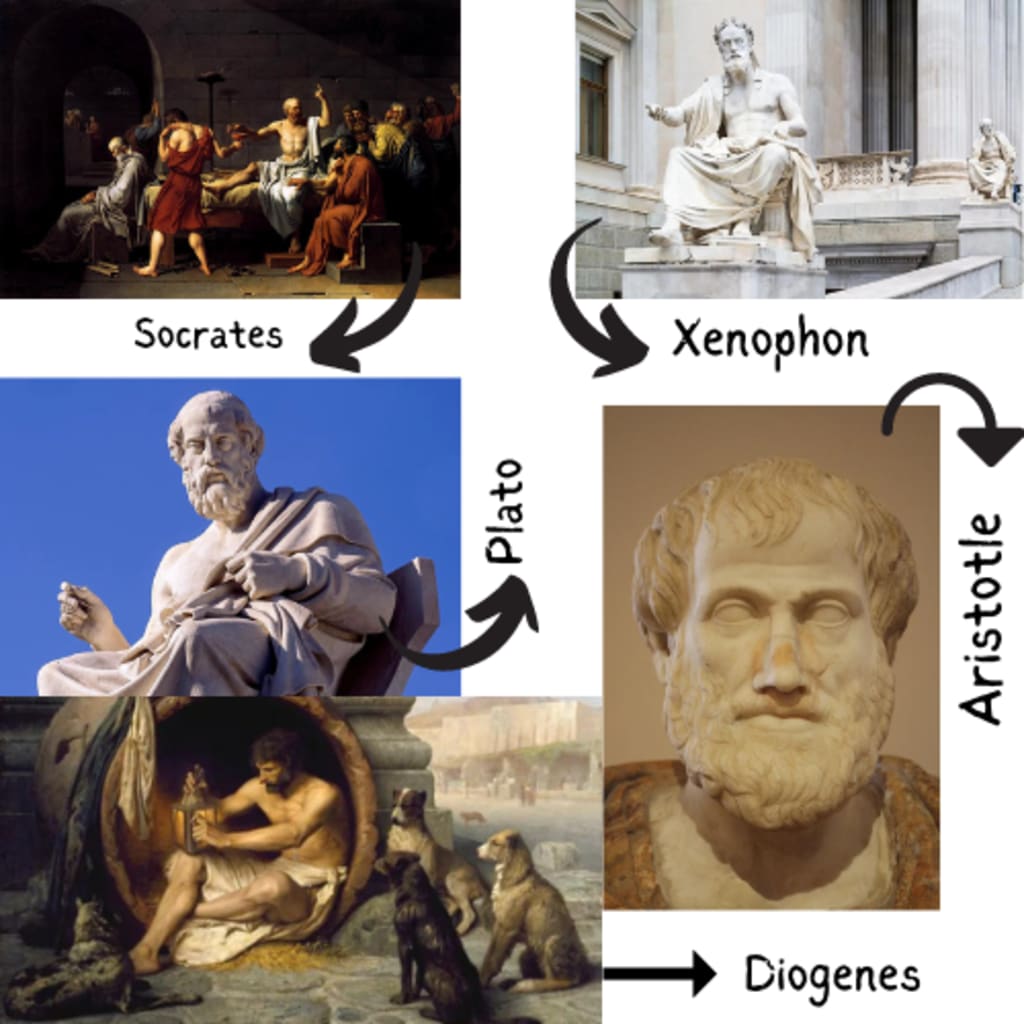Top 5 philosopher name in the world
Top 5 philosopher name in the world

1. Socrates
He lived in Athens from 470 to 399 BC.
He tried to explain it to people all his life.You can
be happy without money.
“To find yourself, think for yourself.”
“He who is not a good servant will not be a good master.”
He who is not contented with what he has, would not be
contented with what he would like to have.
Born circa 470 B.C. in Athens, Greece, Socrates's life is chronicled through only a few sources: the dialogues of Plato and Xenophon and the plays of Aristophanes.
Because these writings had other purposes than reporting his life, it is likely none present a completely accurate picture. However, collectively, they provide a unique and vivid portrayal of Socrates's philosophy and personality.
Socrates was the son of Sophroniscus, an Athenian stonemason and sculptor, and Phaenarete, a midwife. Because he wasn't from a noble family, he probably received a basic Greek education and learned his father's craft at a young age. It's believed Socrates worked as mason for many years before he devoted his life to philosophy.
Contemporaries differ in their account of how Socrates supported himself as a philosopher. Both Xenophon and Aristophanes state Socrates received payment for teaching, while Plato writes Socrates explicitly denied accepting payment, citing his poverty as proof.
Socrates married Xanthippe, a younger woman, who bore him three sons: Lamprocles, Sophroniscus and Menexenus. There is little known about her except for Xenophon's characterization of Xanthippe as "undesirable."
He writes she was not happy with Socrates's second profession and complained that he wasn’t supporting family as a philosopher. By his own words, Socrates had little to do with his sons' upbringing and expressed far more interest in the intellectual development of Athens' other young boys.
2. Plato
Ancient Greek philosopher Plato was a student of Socrates
Plato was born in Athens in approximately 428 B.C.E. He was raised in a moderately wealthy, aristocratic family with high political connections. His father was named Ariston and his mother Perictione. According to a late Hellenistic account by Diogenes Laertius, Plato's given name was Aristocles. Various alternatives are offered at how Plato received his name. One possibility is that his wrestling coach, Ariston of Argos, dubbed him "Platon" (meaning "broad") on account of his robust figure. Another alternative is that his name derived from the breadth (platutês) of his eloquence, and still a third from the fact that he was very wide (platus) across the forehead. In any case, in his youth Plato was a gifted wrestler and his intellectual abilities were so advanced that his fellow Greeks declared him to be the son of Apollo. In fact, it was rumored that in his infancy bees had settled on his lips as a prophecy of the honeyed words which would flow from them.
At some point in his youth Plato became a devoted pupil of Socrates, the famous “wandering scholar” who sat on the street corners of Athens and engaged the young men of the city in intellectual discussions. It was primarily through the texts of Plato, in fact, that we learn of the life, teachings, and death of Socrates. It is considered a matter of record that Plato attended his master's trial and execution so that the Apology, although written in dramatic form is nonetheless considered to be a fairly accurate historical account. Moreover as he was deeply affected by the city's unfair treatment of Socrates much of Plato’s work is devoted to the problem of social and political injustice. During the twelve years following the death of Socrates, Plato traveled extensively throughout Italy, Sicily, Egypt, and Cyrene. During his travels, however, he did not merely wander about in search of pleasure but rather engaged in a sustained and comprehensive quest for knowledge.
After his return to Athens at the age of 40, Plato founded one of the earliest known organized schools in Western civilization on a plot of land in the grove of Academe. The “Academy,” as it was famously called, was a large, protected plot of land that was supposedly named after either an Athenian citizen named Academus or else some ancient Greek hero. The school operated until 529 C.E., which makes it the longest running academic institution in the history of western civilization. Many intellectuals were schooled in the Academy, the most prominent one being Plato’s pupil Aristotle.
Plato died around 348 B.C.E. at the age of 80 or 81.
3. Aristotle
He made contributions on theses to logic, criticism,
rhetoric, physics, biology, psychology,
mathematics, metaphysics, ethics and politics.
Aristotle was born circa 384 B.C. in Stagira, a small town on the northern coast of Greece that was once a seaport.
Aristotle’s father, Nicomachus, was court physician to the Macedonian king Amyntas II. Although Nicomachus died when Aristotle was just a young boy, Aristotle remained closely affiliated with and influenced by the Macedonian court for the rest of his life. Little is known about his mother, Phaestis; she is also believed to have died when Aristotle was young.
After Aristotle’s father died, Proxenus of Atarneus, who was married to Aristotle’s older sister, Arimneste, became Aristotle’s guardian until he came of age. When Aristotle turned 17, Proxenus sent him to Athens to pursue a higher education. At the time, Athens was considered the academic center of the universe. In Athens, Aristotle enrolled in Plato’s Academy, Greek’s premier learning institution, and proved an exemplary scholar. Aristotle maintained a relationship with Greek philosopher Plato, himself a student of Socrates, and his academy for two decades. Plato died in 347 B.C. Because Aristotle had disagreed with some of Plato’s philosophical treatises, Aristotle did not inherit the position of director of the academy, as many imagined he would.
4. Xenophon
He was a philosopher of ancientnnGreek
He was a student of Socrates.
We know little about Xenophon’s very early life. He was born into an aristocratic family around 430 BCE in Athens to a certain Gryllus, but the exact date is not known. In his early years, Xenophon apparently belonged to the circle around Socrates. Seemingly against the advice of Socrates, Xenophon (probably around 401 BCE) became part of a Persian expeditionary force led by Cyrus the Younger against his older sibling, King Artaxerxes II of Persia. The events of this invasion of Asia Minor are told in Xenophon’s Anabasis (literally, “ascent” or “march from the sea to the interior”). Cyrus set out under a false pretext with a Persian army and a considerable number of Greeks. By the time they arrived at Tarsus, Cyrus’ troops became aware of his scheme to depose the king, and refused to continue. Clearchus, a Spartan general, persuaded the Greek contingent of Cyrus’ forces to continue, and they fought the troops of Artaxerxes II in the Battle of Cunaxa, where Cyrus was killed. A peace conference was convened in which Clearchus and four other generals and a host of captains were betrayed and brutally executed. The so-called “ten thousand” Greek mercenaries were now without a leader, deep in enemy territory. Xenophon along with several others was chosen to lead, and the “ten thousand” marched on, facing Persian and Medean forces until they arrived at Trapezus on the Black Sea. The joyful cries of the Greek soldiers upon reaching the sea, thalatta, thalatta, (the sea! the sea!), were deeply ingrained in the classical memory of Western civilization until the day before yesterday. Indeed, the lines appear and reappear in literature, for example in the first chapter of James Joyces’ Ulysses. Because of its relatively straightforward prose, the Anabasis of Xenophon was for many centuries a primary text in the instruction of ancient Greek.
4. Diogenes
He thought it was best
to live in poverty .
He showed that nothing .
is necessary to survive .
Diogenes of Sinope (c. 404-323 BCE) was a Greek Cynic philosopher best known for holding a lantern to the faces of the citizens of Athens claiming he was searching for an honest man. He was most likely a student of the philosopher Antisthenes (445-365 BCE) and, in the words of Plato (allegedly), was “A Socrates gone mad.” He was driven into exile from his native city of Sinope and settled in Athens. He had written to a friend to rent him a small house there but, when this friend failed to find a place, Diogenes threw his cloak into a large, empty, wine cask outside the temple of Cybele near the Agora and called it home. He lived in the cask his entire time in Athens. He became interested in the teachings of Antisthenes and asked to be admitted to his school. Antisthenes at first refused him as a student, even beating him with his staff to drive him away, but eventually was worn down by his persistence. Diogenes would take his teacher's beliefs to an extreme degree. Like Antisthenes, Diogenes believed in self-control, the importance of personal excellence in one's behavior (in Greek, arete, usually translated as "virtue"), and the rejection of all that was considered unnecessary in life such as personal possessions and social status. He was so ardent in his beliefs that he lived them very publicly in the market place of Athens. He owned nothing, lived on the streets of Athens, and seems to have subsisted on the charity of others. He owned a cup which served also as a bowl for food but threw it away when he saw a boy drinking water from his hands and eating food off a piece of bread, realizing one did not even need a bowl for sustenance.
About the Creator
Enjoyed the story? Support the Creator.
Subscribe for free to receive all their stories in your feed. You could also pledge your support or give them a one-off tip, letting them know you appreciate their work.






Comments
There are no comments for this story
Be the first to respond and start the conversation.